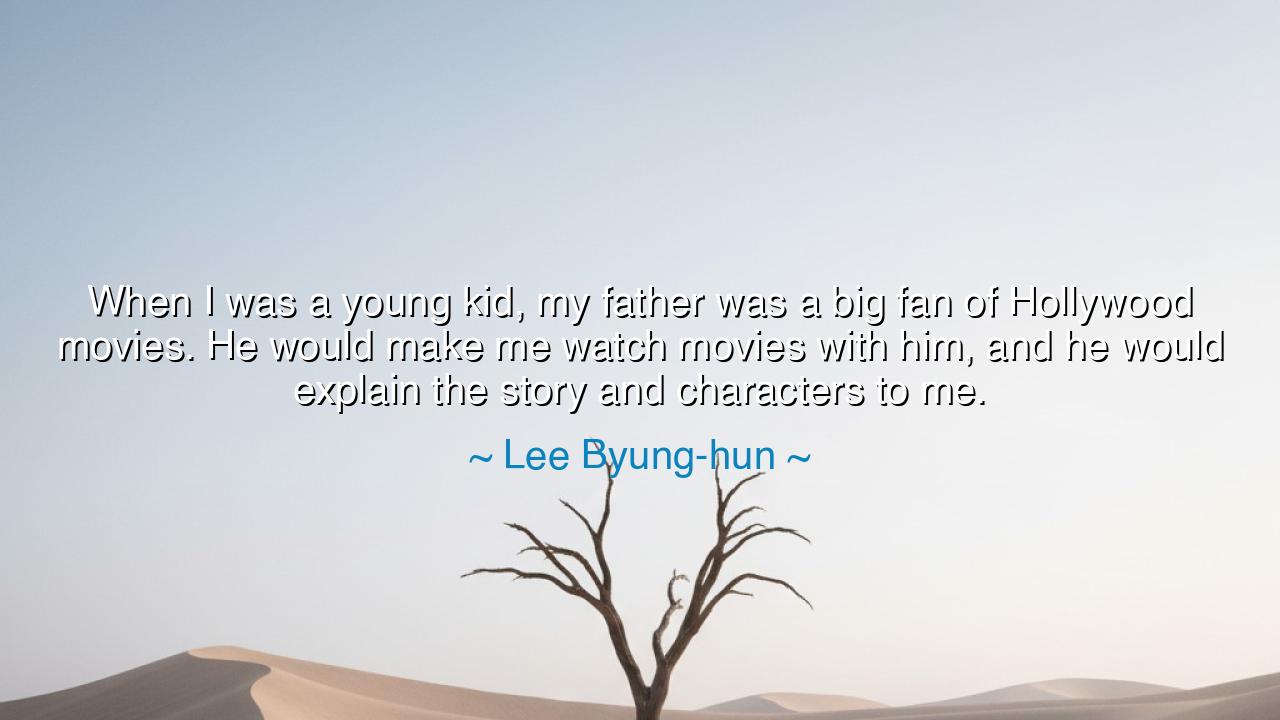
When I was a young kid, my father was a big fan of Hollywood
When I was a young kid, my father was a big fan of Hollywood movies. He would make me watch movies with him, and he would explain the story and characters to me.






Lee Byung-hun’s words, "When I was a young kid, my father was a big fan of Hollywood movies. He would make me watch movies with him, and he would explain the story and characters to me," reflect the profound influence of storytelling and the power of parental guidance in shaping our understanding of the world. Byung-hun’s father, a lover of Hollywood cinema, recognized the value in passing down wisdom and life lessons through the medium of film. Through this experience, the father not only shared his passion for movies but also took on the role of a mentor, guiding his son through the complex narratives and characters that often reflect deeper truths about human nature and society. This practice echoes a timeless tradition of using stories as a means of teaching and connecting generations.
In the ancient world, the act of storytelling was sacred. In Greek culture, the bards, such as Homer, were entrusted with the task of passing down not only historical events but also the values and lessons of their society. The Iliad and The Odyssey were not just epic tales; they were tools for teaching the heroic virtues of courage, loyalty, and honor. In much the same way, Lee Byung-hun’s father sought to teach through the medium of film, much like the ancient storytellers used their epic poems to instill moral values. The father’s explanation of the movies he watched with his son mirrors the role of the ancient storyteller, who did not simply narrate the events, but took the time to ensure that the younger generation understood the deeper meanings behind the tales.
The story of Socrates and his dialogues with his disciples also illustrates this ancient practice of passing on wisdom through conversation and explanation. Socrates did not simply lecture his students; he engaged them in conversation, asking probing questions to help them discover truths for themselves. Similarly, Lee’s father was not just exposing him to films, but actively helping him process and understand the stories and characters. This active engagement in learning aligns with the Socratic method, where knowledge is passed down not through rote memorization, but through deep conversation and reflection. Byung-hun’s father was imparting wisdom, helping his son not just to watch the stories, but to truly comprehend the lessons hidden within them.
The ancient Chinese philosopher Confucius also valued the importance of teaching through storytelling. In his Analects, Confucius speaks often of the power of story in conveying moral and ethical lessons. Confucius was a master of blending historical examples, proverbs, and stories to help his disciples understand the complexities of human behavior and social relations. In this tradition, Lee Byung-hun’s father recognized the power of film as a tool to nurture moral insight and understanding in his son, much as Confucius used stories to teach his followers about justice, kindness, and respect. The father, like Confucius, knew that the stories, whether told through films or ancient texts, could have a profound impact on shaping the character and beliefs of the younger generation.
Byung-hun’s experience with his father also highlights the importance of mentorship in personal development. In ancient societies, the relationship between mentor and student was crucial for the transmission of wisdom. Aristotle, for example, mentored Alexander the Great, passing down lessons of leadership, ethics, and philosophy. This relationship was not just about imparting knowledge, but about shaping the student’s worldview and moral compass. Similarly, Lee’s father was not just teaching his son about movies, but about life, human nature, and empathy through the lens of the characters and stories they watched together. The films were vehicles for understanding the complexity of the human experience, and the father’s role was to help his son uncover these lessons and apply them to his life.
The lesson to be learned from Lee Byung-hun’s reflection is that stories, whether they come from ancient texts or modern films, are more than just entertainment—they are tools for learning and growth. In our own lives, we should seek not only to consume stories but to understand and reflect on the deeper meanings behind them. Just as Homer’s tales shaped the Greeks, Confucius’ proverbs guided the Chinese, and Socrates’ dialogues inspired his disciples, so too can the stories we engage with shape us. The key is in the active reflection on these stories, and the mentorship that helps us navigate the lessons they offer.
As you move forward in life, seek mentorship from those around you, and also offer it to others. Whether through movies, books, or personal experiences, recognize the power of stories in shaping who we are. Like Lee’s father, you can play an active role in helping others see the deeper meaning in the world around them. Just as Socrates did not simply teach facts but encouraged his students to question and reflect, so too can you help others not just to consume knowledge, but to understand and apply it in ways that enrich their lives. Teach through stories, guide with wisdom, and always seek to uncover the profound truths hidden within the narratives we encounter.






AAdministratorAdministrator
Welcome, honored guests. Please leave a comment, we will respond soon